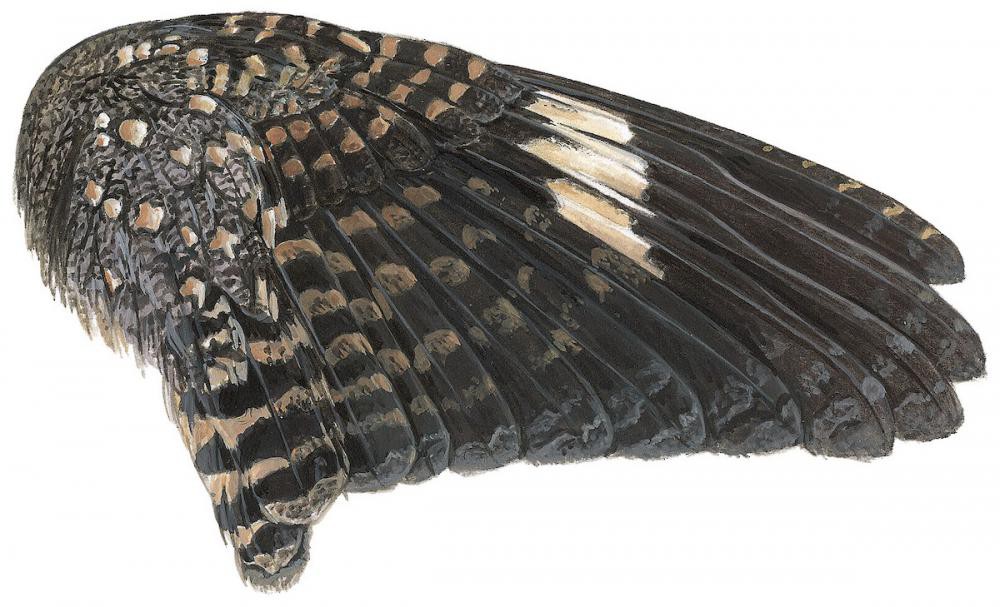Nechisar Nightjar / Caprimulgus solala

Nechisar Nightjar
SCI Name:
Protonym: Caprimulgus solala Ibis 137 p.301-307
Taxonomy: Caprimulgiformes / Caprimulgidae / Caprimulgus
Taxonomy Code: necnig1
Type Locality:
Author: Safford, Ash, Duckworth, Telfer & Zewdie
Publish Year: 1995
IUCN Status: Vulnerable
DEFINITIONS
CAPRIMULGUS
(Caprimulgidae; Ϯ European Nightjar C. europaeus) L. caprimulgus nightjar < capra nanny-goat < caper, capri billy-goat; mulgere to milk; “Those called goat-suckers ... enter the shepherds’ stalls and fly to the goats’ udders in order to suck their milk, which injures the udder and makes it perish, and the goats they have milked in this way gradually go blind” (Pliny X, lvi (ed. Rackham 1983)); this unfounded rustic superstition was for long associated with the European Nightjar; "NIGHT-HAWK (C. popetue). I have noticed, when skinning this bird, that the male, in spring, exhales a strong hircine odor. If this is common to all birds of the family, it may have added apparent reason to the superstition from which the family name is derived." (Coues 1874); "102. CAPRIMULGUS. Rostrum incurvum, minimum, subulatum, basi depressum. Vibrissæ ad os serie ciliari. Rictus amplissimus. ... Caprimulgus genere differt ab Hirundine, uti Strix a Falcone, Phalæna a Papilione." (Linnaeus 1758); "Caprimulgus Linné, Syst. Nat., ed. 10, 1, 1758, p. 193. Type, by tautonymy, Caprimulgus europaeus Linné (Caprimulgus, pre-binomial specific name in synonymy." (Peters, 1940, IV, p. 196). Linnaeus's Caprimulgus, the final avian genus listed in his historic ground-breaking work, comprised two species (C. europæus, C. americanus).
Synon. Allasma, Capripeda, Climacurus, Cosmetornis, Creapyga, Crotema, Diaphorasma, Eximiornis, Hypsiphornis, Macrodipteryx, Nyctichelidon, Nycticircus, Nyctitypus, Nyctipornis, Nyctisyrigmus, Nyctivociferator, Phalaenivora, Rossornis, Scotornis, Semeiophorus, Stelidopterus, Vociferator.
caprimulgus
L. caprimulgus nightjar < capra nanny-goat < caper, capri billy-goat; mulgere to milk (cf. Gr. αιγοθηλας aigothēlas goatsucker).
solala
L. solus, solius only, sole; ala wing.
● "In a completely treeless area, a decomposing road corpse, perhaps a few days to a week old, was found partly submerged in soil in a vehicle track. Several feathers, including the tail, blew away as soon as they were freed from the earth, but a wing was salvaged in good condition ... Although a complete specimen is lacking, the wing is one of the most distinctive of any from a nightjar, and we are confident in assigning it to a new species which we name Caprimulgus solala, sp. nov. Nechisar Nightjar ETYMOLOGY The name for the new species derives from the Latin solus (only) and ala (a wing), owing to the availability of only a single wing from which to describe it. Ala is a noun used in apposition and therefore keeps its feminine inflection" (Safford et al., 1995) (‡Caprimulgus).
UPPERCASE: current genus
Uppercase first letter: generic synonym
● and ● See: generic homonyms
lowercase: species and subspecies
●: early names, variants, mispellings
‡: extinct
†: type species
Gr.: ancient Greek
L.: Latin
<: derived from
syn: synonym of
/: separates historical and modern geographic names
ex: based on
TL: type locality
OD: original diagnosis (genus) or original description (species)












